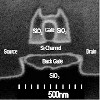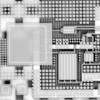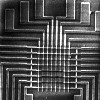Infrastructures that respond to changing needs and openly share can be a tremendous tool for progress and well-being. In our world, mass transit, phone system, internet, medical care, education, and others provide compelling examples, some that succeed very well, some not so. The ones that succeed usually are ones that are constantly learning and evolving.
National Nanotechnology Infrastructure Network (NNIN), a multi-university organization funded by National Science Foundation that I am associated with, is an infrastructure organization in support of research and development and outreach tied to the nanoscale. Nearly 1500 PhDs graduate every year using its resources and more than 350 small and large companies develop ideas. The infrastructure here brings advanced tools and knowledge together so that people can focus on their research interest and draw on the developments from others, particularly from other disciplines. NNIN also makes possible, through its collective strength, learning and education through events (workshops, symposia, educational events at professional conferences).
Here, you will find links with and talks and other information of interest to graduate and undergraduate students are researchers.
- Organic Electronics and Optoelectronics (December, 2008; an international Winter School for Graduate Students). A selection of graduate students from across the United States, and US faculty, joined with graduate students and faculty of India at Indian Institute of Technology, Kanpur for this course in December of 2008. In addition to 6 full days of teaching the student participants participated in field work in a tribal area in south east India. These courses are annual events, different subjects each year, and selection is highly competitive. If interested, look for the announcement in early fall at NNIN's website.
- Symposium on Computing Challenges (October, 2008; a Kavli-NNIN event). At the nanoscale, one can fit trillions of devices in a chip-scale area. This is many orders of magnitude more than we can accomplish today. The Symposium on Computing Challenges brings together people with hardware, software, neuroscience, physics, and mathematics perspectives to discuss the key problems and the possible approaches to solutions for effectively harnessing trillions of devices that are made possible by use of the nanoscale.
- Nanotechnology Showcase (multiple events every year). Of interest to undergraduate students interested in learning about nanotechnology, its possibilities and challenging questions, and the underlying knowledge tied to undergraduate curriculums of various disciplines.
Some others that I follow often, are
- Kavli Institute of Theoretical Physics: a tremendous source of discussion and learning in advanced problems of sciences






